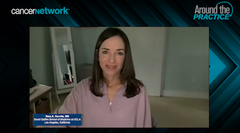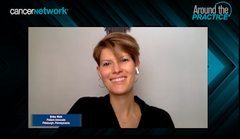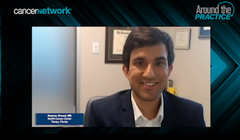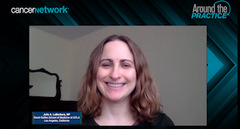
HER2+ MBC: Preparing Patients for Chemotherapy
Adverse events commonly associated with chemotherapies used to treat HER2-positive metastatic breast cancer, and recommendations to help equip patients with knowledge about what to expect during their treatment journey.
Episodes in this series

Sara A. Hurvitz, MD: How about the adverse effects of therapy. You indicated that you tolerated THP [docetaxel, trastuzumab, pertuzumab] well. I would have to say that’s not everybody’s experience. Julia, can you take us through some of the typical adverse effects of frontline THP, what we expect, and how you prepare patients and see them through those first 6 cycles where the chemotherapy is the component of the regimen?
Julia A. LaBarbera, NP: A lot of the adverse effects I would say are mostly related to the chemotherapy itself. With docetaxel, of course, there can be lowering of the white blood cell count, [so] we do need to monitor that prior to each cycle. There can be hair loss, unfortunately, so patients are encouraged to pursue cold capping if that’s an option for them. There could be peripheral neuropathy which you tend to see in the later cycles, and of course, some nausea, bowel changes, constipation, diarrhea. We do have [an] extensive teaching visit prior to patients starting where we go through each of these adverse effects individually and how to manage them, just to prepare the patients and their families to be more proactive at managing these symptoms at home. Once they get to be trastuzumab and pertuzumab maintenance therapy, that’s well tolerated. You can see diarrhea and skin rash, which are the most common adverse effects. Of course, there’s always the risk of cardiotoxicity. We do have to educate patients to report any new cough or shortness of breath or swelling, weight changes, things like that. But generally, that portion is much better tolerated when you’re doing the 3 drugs combined.
Sara A. Hurvitz, MD: As you mentioned doing a session with patients before they start therapy to go through everything in great detail and give them printed materials is very helpful because it’s hard to remember everything that you hear in your oncologist’s office and the throes of a new diagnosis. Erika, how did your team prepare you for your treatment? What do you feel they did effectively, or maybe not as effectively? I also want you to talk about mental well-being and whether you were given resources to help you through such a difficult and scary diagnosis.
Erika Rich: Getting ready for the adverse effects, I would say was one of the most anticipated and scary parts of it. During those first few rounds, I did lose my hair and had some trouble with my bowels, just being very inconsistent which was something that I was not prepared for and didn’t know how to handle it first. Now on year 3 of this cancer journey, I have that down pat. I do forget about it when it came to preparing for what to expect whenever I did start taking my medicine. This was prior to COVID-19. My parents are happily divorced, I had my dad, mom, and aunt in there, some sisters at all times—we all had our notepads out. Everyone had different things to contribute that they remembered but one of the big things that I made sure to do was to just stay hydrated. That was a tip that another breast cancer patient had given me beforehand. I was drinking minimum 2 liters of water and an entire thing of Pedialyte every time I had treatment and for 3 days afterwards to flush out of my system. I will say that helps quite a lot. Then, when it came time for the mental side of things, that was something I was not prepared for at all. The hair loss and just physical change of it was mentally a lot more straining than I had anticipated and that wasn’t something they prepared me for.
Luckily, I found a cancer therapist from the time that I started my treatment, and it was one of the biggest blessings. I was able to meet with her in person at first. I was also able to bring my family in to come meet with her and just talk with her as well, because like you mentioned before, this was a big change for me, but it also was a big change for my family. Being so young, I was very adventurous. To me, I was like, “Oh wow, 6 months off work. This is amazing.” I did try and travel a lot. My family was very nervous about the fact that my counts were low. My white blood counts were low so everyone was throwing in tips and tricks of how to travel safely, driving, and who I can see with my friends and going out in public, and granted, this is before COVID-19 and everything happened. I was cool wearing my mask and gloves and hand sanitizer all the time and I was really strict with that regimen. I didn’t touch anything without sanitizing my hands. I didn’t go anywhere without wearing a mask and I still felt comfortable flying and traveling around. That was nice. It helped a lot with my mental state of being because I wasn’t just stuck at home in my bed, staring at my family. It rejuvenated me a lot. I would say that contributed to a lot of it. I’m a big advocate for medical marijuana and that was something that I relied on during this time. It helped a lot with my nausea. It made me feel so much better. It did keep me back from being able to travel and go out of the house a little bit just because of pain and helping manage. I didn’t really want to leave the house, but it did also help with my appetite and things of that nature. My weight fluctuated a bit, but that really helped keep it consistent amongst other things.
Sara A. Hurvitz, MD: Great point. It’s clear that in the setting of a new diagnosis, especially the mental well-being and mental health is key for us as clinicians to think about as we are educating and helping you. It sounds like you found things that you love to help distract you, traveling and being with family, and you had a good support system. It’s important to remind us clinicians to be cognizant of the effects on mental health that this diagnosis has.
Transcript edited for clarity.
Newsletter
Stay up to date on recent advances in the multidisciplinary approach to cancer.







































